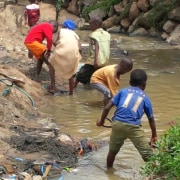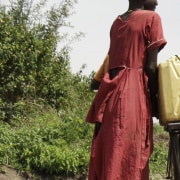|
Getting your Trinity Audio player ready...
|
In March 2020 Corruption Watch (CW) and the Water Integrity Network (WIN) released an important report, Money down the Drain: Corruption in South Africa’s water sector, which examined the extent and drivers of corruption in the water and sanitation sector and made recommendations on actions to be taken to address such corruption and maladministration.
The report highlighted the extent to which corruption has become systemic, involving all levels of society, and rife in both the public and private sectors.
Almost two months later the Department of Water and Sanitation announced its receipt of reports on investigations into maladministration. This follows on a commitment made by Minister Lindiwe Sisulu in her 2019 departmental budget vote, in which she named a number of challenges that the department had to overcome to regain public trust. One of these, she said, was the “biggest problem: huge financial mismanagement, with the result that so many of our top officials at national and municipal levels are under investigation”.
All current investigations were to be fast-tracked and concluded, she said. The department would also study the Auditor-General’s reports, and ensure consequences for offenders.
Earlier in May 2020 the department proclaimed in a statement that it had followed through on its commitment. As mentioned in the budget vote speech, Sisulu appointed a team which was assisted by investigators approved by National Treasury. The first phase of investigations was now complete, the statement revealed.
Six of the 48 cases of serious misconduct within the department were prioritised. The six cases involve two deputy directors-general and two chief directors. “In one case, a senior official was allegedly involved in awarding irregular contracts to the value of R7-billion,” the statement noted.
A total of R16.5-billion in irregular expenditure was uncovered, while the department lost R1.7-billion to fruitless and wasteful expenditure. The department said that around 180 cases of less serious misconduct were being handled internally. The Covid-19 lockdown has caused some delays.
One of the water boards named in the CW/WIN report – the Lepelle Northern Water Board in Limpopo – as well as the Amatola Water Board in the Eastern Cape are under investigation for irregular expenditure, mismanagement and governance issues. “The CEOs of both entities are currently on precautionary suspension to allow the investigations to continue”.
The department has received the forensic investigation reports and is preparing to hand these over to the law enforcement agencies, while Sisulu will share her findings with Parliament’s standing committee on public accounts as soon as possible.
Multitude of players in water corruption
The CW/WIN report drew on a number of sources for its information, including reports by the Auditor-General, the Special Investigating Unit, and the media. It revealed the involvement of a vast array of players, from plumbers, tanker drivers and senior officials, to mayors to ministers, who benefited richly from corruption, and in some cases, actively promoted it.
The organisations also fingered private individuals and businesses who deliberately exploit weaknesses in the public sector, ultimately impacting acutely on water security and on the human right to water. “Some companies have actively created conditions which serve their own ends, and in which corruption flourishes,” the report noted.
The report made a set of recommendations that encompass an overarching strategic approach, and then focus on more specific interventions. These include:
- Designating the water sector as an ‘island of integrity’;
- Ending impunity and instilling a culture of consequences;
- Ensuring the appointment of honest, ethical and committed leaders to run key institutions;
- Improving and strengthening procurement systems and practices, as outlined in the National Development Plan, including integrity pacts, e-procurement, open contracting data standards, and red flag monitoring;
- Facilitating transparency in regulatory decisions;
- Addressing broader environmental factors; and
- supporting the media and civil society to uncover corrupt activities and pursue them until appropriate remedial action is taken.








